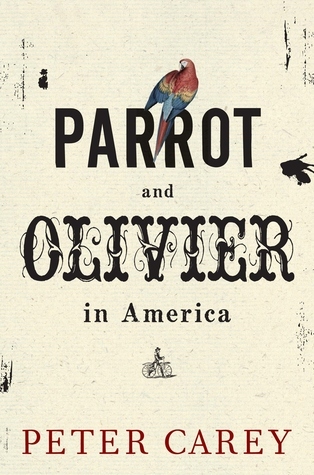What do you think?
Rate this book


464 pages, Hardcover
First published October 26, 2009
On board the ship there had been much talk about the healthy breezes on Manhattan. They must have meant the winds blowing from the arses of the New York pigs. Beekman Street stank like a shit heap, worse than the faubourg Saint-Antoine. We headed south, past Theater Alley, into a smudgy charcoal sort of maze in which the high-haunched New York pigs mingled with New York clerks, their collars all turned down and a great deal of vanity showing on their wispy chins. I mean the clerks.
On the starboard side, as it drifted silently toward the dock, stood what might have been the emblem of America: frock-coated, very tall and straight, with a high stovepipe hat tilted back from his high forehead. I thought this is the worst vision of democracy – illiterate, hard as wood, overdressed, uncultured, with that physiognomy I had earlier observed in the portrait of the awful Andrew Jackson – a face divided proudly in three equal parts: hairline to eyebrows, eyebrows to nose, lips to chin. In other words, the face of one who will never give any weight to the wisdom of his betters. To see the visage of their president is to understand that the farmer and the mechanic are the lords of the New World. Public opinion is their opinion; the public will is their will. This was on no account what I hoped to find.
And Tartuffe you would have had, but there was not a bloody crumb of him. The old Yankee said he had no call for Tartuffe. I did not believe him until he showed me he had almost nothing in the language. It was English floor to ceiling, books of the very worst kind. How to do this. How to do that. And Bibles. And arguments about the soul. Shelves of them, and not a word you'd take some pleasure in.
“It will not ripen well.”This book was on the shortlist of six books for the 2010 Man Booker Prize. It was also a finalist for the 2010 National Book Award.
…
“… I mean this, democracy. It is a truly lovely flower, a tiny tender fruit, but it will not ripen well. You will see.”
…
“I tried to love it,” he said. “I could not.”
…
“I saw the awful tyranny of the majority,” he said.
…
“… Listen to me well. In a democracy there is not that class with the leisure to acquire discernment and taste in all the arts. Without that class, art is produced to suit the tastes of the market, which is filled with its own doubt and self-importance and ignorance, its own ability to be tricked and titillated by every bauble. If you are to make a business from catering to these people, the whole of your life will be spent in corrupting whatever public taste might struggle toward the light, tarnishing the virtues and confusing the manners of your country. …
…
“From what will they get their culture?” He cried, “the newspapers? God help you all.”
…
“Have you met Andrew Jackson? I have. He is a woodsman, an orphan. Mercy on you all.”
…
“Yes, and you will follow fur traders and woodsmen as your presidents, and they will be as barbarians at the head of armies, ignorant of geography and science, the leaders of mob daily educated by a perfidious press which will make them so confident and ignorant that the only books on their shelves will be instruction manuals, and only theater gaudy spectacles, and the paintings made to please that vulgar class of bankers, men of no moral character, half-bourgeois and half-criminal, who will affect the tastes of an aristocracy but will compete with each other like wrestlers at a fair, wishing only to pay the highest price for the most fashionable artist. Do not laugh, sir. Listen. I have traveled widely. I have seen this country in its infancy. I tell you what it will become. The public squares will be occupied by an uneducated class who will not be able to quote a line of Shakespeare.”
 Alexis de Tocqueville
Alexis de Tocqueville